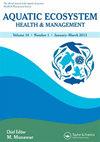多管辖区组织在发展大湖区渔业生态系统管理方面的作用
IF 0.8
4区 环境科学与生态学
Q4 ENVIRONMENTAL SCIENCES
引用次数: 2
摘要
大湖区渔业委员会的法定职责之一是促进各管辖区之间大湖区渔业管理的协调。为了做到这一点,大湖渔业委员会自1964年以来每年都在大湖渔业专业人员中组织湖泊委员会会议。我们的目标是描述大湖区渔业委员会在促进渔业管辖区之间的沟通方面的作用,这些沟通推动了该流域基于生态系统的管理原则的发展。湖泊委员会会议的会议记录和大湖渔业委员会协助的贫营养湖泊鲑鱼群落研讨会的出版物是根据12项先验的基于生态系统的管理原则编写的。通过二分网络分析(与会议相连的组织)分析会议和研讨会出席人数数据,以确定出席会议的人数是在渔业治理网络内分组还是集群。没有发现重大集群,这表明在1970-75年期间,大湖区的渔业专业人员在性质上是合作的,而前半个世纪几乎没有跨管辖区管理的报告。我们根据会议出席情况和会议上的编码讨论进行的分析表明,在1972年之前讨论了三个基于生态系统的管理视角(生态完整性、等级背景和人类融入自然),而在1972-74年的湖泊委员会会议和贫营养湖泊鲑鱼群落研讨会上的讨论影响了关于数据的讨论1975年湖泊委员会会议上的收集、生态系统边界和等级背景。大湖区渔业委员会在促进大湖区司法管辖区之间的沟通方面发挥了桥梁作用。这些年会正在成为专业人士合作讨论渔业管理问题的论坛,从而在整个流域推进基于生态系统的管理原则。最终,湖泊委员会会议上的讨论有助于大湖区渔业委员会和相关渔业管理组织同意通过1981年批准《大湖区渔业管理联合战略计划》,在基于生态系统的管理下管理大湖区渔业。本文章由计算机程序翻译,如有差异,请以英文原文为准。
The role of a multi-jurisdictional organization in developing ecosystem-based management for fisheries in the Great Lakes basin
One of the mandated charges to the Great Lakes Fishery Commission is to facilitate the coordination of Great Lakes fishery management across jurisdictions. To do this, the Great Lakes Fishery Commission organized annual lake committee meetings among Great Lake fishery professionals since 1964. Our objective was to describe the role of the Great Lakes Fishery Commission in facilitating communication among fishery jurisdictions that fueled the development of ecosystem-based management principles in the basin. Meeting minutes from lake committee meetings and publications from the Great Lakes Fishery Commission-facilitated Salmonid Community of Oligotrophic Lakes workshop were coded based on 12 a priori ecosystem-based management principles. Meeting and workshop attendance data were analyzed through a bipartite network analysis (organizations connected to meetings) to determine if attendance at meetings were grouped, or clustered, within the fishery governance network. No significant clusters were detected, demonstrating that during 1970-75 fishery professionals in Great Lakes were cooperative in nature – in contrast to the prior half century where little cross-jurisdictional management was reported. Our analyses based on meeting attendance and coded discussions at the meetings demonstrated that three ecosystem-based management perspectives were discussed prior to 1972 (ecological integrity, hierarchical context, and humans embedded in nature) whereas discussions at lake committee meetings from 1972-74 and the Salmonid Community of Oligotrophic Lakes workshop influenced discussions about data collection, ecosystem boundaries, and hierarchical context at lake committee meetings in 1975. The Great Lakes Fishery Commission played a bridging role in facilitating communication among Great Lakes jurisdictions. These annual meetings were becoming a forum for professionals to collaboratively discuss fishery management issues, thereby advancing ecosystem-based management principles throughout the basin. Ultimately discussions at lake committee meetings helped contribute to the Great Lakes Fishery Commission and allied fishery management organizations agreeing to manage Great Lakes fisheries under ecosystem-based management through the ratification of A Joint Strategic Plan for Management of Great Lakes Fisheries in 1981.
求助全文
通过发布文献求助,成功后即可免费获取论文全文。
去求助
来源期刊

Aquatic Ecosystem Health & Management
环境科学-海洋与淡水生物学
CiteScore
1.70
自引率
0.00%
发文量
1
审稿时长
18-36 weeks
期刊介绍:
The journal publishes articles on the following themes and topics:
• Original articles focusing on ecosystem-based sciences, ecosystem health and management of marine and aquatic ecosystems
• Reviews, invited perspectives and keynote contributions from conferences
• Special issues on important emerging topics, themes, and ecosystems (climate change, invasive species, HABs, risk assessment, models)
 求助内容:
求助内容: 应助结果提醒方式:
应助结果提醒方式:


